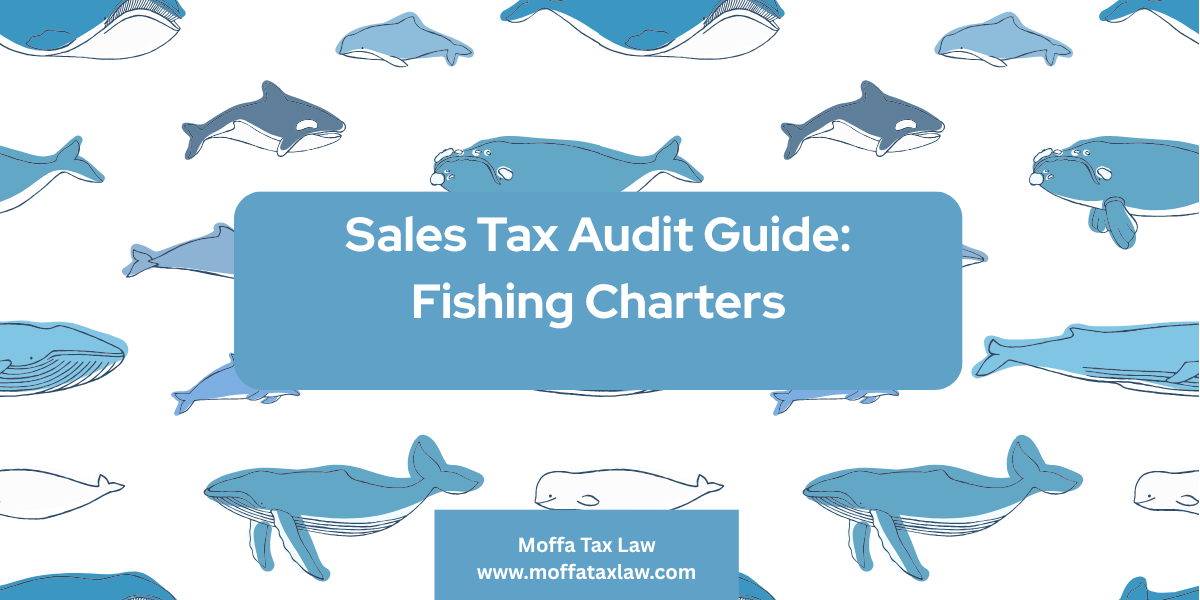NEWS & INSIGHTS


Florida may be the sportfishing capital of the U.S., but navigating its tax rules isn’t as straightforward as steering a boat. With thousands of charter fishing businesses operating across the state, understanding how sales tax applies—or doesn’t apply—to your business model is essential.
Many charter captains don’t realize that the way they price their trips can turn a tax-exempt fishing service into a taxable admission under Florida law. This article breaks down the critical differences between charter boats and head boats, explains the rules on tournament fees, and provides essential tips to help your business avoid costly audits and penalties.
Charter Boat or Head Boat? The Tax Law Cares
What Is a Charter Boat?
If your business offers a private boat for hire, complete with crew and fishing gear, and you charge a single flat rate for the trip—your service is generally exempt from Florida sales tax. This tax exemption is granted under Section 212.08(7)(y), Florida Statutes. These are often small-group trips—think inshore or offshore excursions for up to six anglers.
What Is a Head Boat?
A head boat, on the other hand, charges individual customers separately for the same fishing trip. Instead of one party renting the whole boat, multiple individuals pay per seat—usually in larger groups, such as 15 to 30 people. Florida tax law treats this as a taxable admission rather than a charter. Under Rule 12A-1.005(3)(k)1, F.A.C., head boat trips are taxed similarly to tickets for sightseeing cruises or entertainment events.
Pricing Language Matters: The Website Trap
Many sales tax audits of charter businesses begin with a simple Google search. Florida Department of Revenue auditors regularly check websites for red flags—especially how trips are priced.
Safer phrasing: “$950 per trip for up to 6 guests”
Risky phrasing: “$160 per person for a 5-hour fishing trip”
Even if your operation meets all other criteria for the exemption, a per-person rate listed publicly may be enough to trigger an audit and classification as a taxable head boat.
Fishing Tournaments: Freshwater vs. Saltwater
Freshwater Tournament Entry Fees
Florida law exempts entry fees for freshwater fishing tournaments from sales tax. This exemption appears in Section 212.04(2)(a)8, F.S.
Saltwater Tournament Entry Fees
Unfortunately, saltwater tournament fees are not exempt. The Florida Administrative Code specifically lists them as taxable, per Rule 12A-1.005(3)(i). This includes kingfish, grouper, and offshore tournaments.
Exception: Events sponsored by 501(c)(3) nonprofits or where spectators are taxed for admission may qualify for different treatment under 212.04(2)(a)2 and 9, F.S.
Bare Boat Rentals: No Captain, No Exemption
Renting out a boat without providing a captain? That’s not a fishing charter—it’s a rental of tangible personal property, and it’s fully taxable under Florida sales tax law.
Non-Fishing Cruises: Watch Out for Sunset Snares
Planning to offer dolphin watching or sunset cruises when not fishing? Those trips are likely taxable admissions, even if operated from the same vessel.
Pro tip: Drop a line. Even one rod in the water can turn a sunset cruise into a fishing charter—if the activity is genuine and properly invoiced.
Audit Risks: What Triggers the DOR?
Top Red Flags for Sales Tax Audits
- Listing “per person” prices online
- Advertising non-fishing trips without tax documentation
- Charging for fishing but not collecting or remitting sales tax
- Failing to file sales tax returns at all
The Statute of Limitations Isn’t Always Three Years
If your business has never filed a sales tax return, the Florida Department of Revenue can audit back to your very first day in business—no limit.
Penalties, Interest & Recordkeeping Nightmares
Florida sales tax audits come with teeth. If the Department of Revenue finds you in noncompliance, you may owe:
- 12% interest annually
- 25%–50% in penalties
- Years of back tax liability
Worse yet, the burden of proof is on you to show your trips qualify for a sales tax exemption. That means solid records, consistent invoice language, and a compliant website are all essential.
Final Thoughts for Florida Charter Operators
Whether you’re running a flats boat for tarpon or a 40-footer for mahi, your success depends on staying compliant with Florida’s complex sales tax rules.
Missteps—often made unintentionally—can turn into audits, penalties, and even financial disaster. Now is the time to ensure your pricing, structure, and tax filings are buttoned up.
Need help reviewing your exposure or defending an audit? Our firm has helped countless Florida businesses navigate these waters—and we’re here to help you too.
Only some do. A charter fishing trip is generally exempt from sales tax if it includes a captain, crew, and charges one flat rate for the entire boat. Charging per person, even on a small boat, can trigger tax liability.
A charter boat is hired as a single unit for a flat fee, often for six or fewer people. A head boat sells seats individually and is treated as charging a taxable admission under Florida law.
Generally, yes. Charging per person is considered a hallmark of a head boat, which is subject to Florida’s sales tax on admissions—even if it’s a small group fishing trip.
Yes. Unless there’s active fishing occurring during the trip, these cruises are taxable as admissions under Florida law, regardless of the vessel used.
Freshwater tournament fees are exempt. But entry fees for saltwater tournaments are generally taxable unless they fall under a special exemption (e.g., 501(c)(3) sponsorship or spectator-based tax coverage).
Yes. A bareboat rental is considered a rental of tangible personal property and is fully taxable, even if the renter intends to use it for fishing.
Even if you invoice correctly, your site wording may lead to a head boat classification.
Yes. If you’ve never registered or filed, there is no statute of limitations, and the audit can go all the way back to the day you started business.
You may face up to 50% in penalties, plus 12% annual interest, and a multi-year lookback. These penalties can devastate small charter operators who are unaware of the tax rules.
You do. Florida’s fishing charter exemption must be affirmatively proven by the business owner, not the state. Poor records or unclear pricing can result in denied exemptions.
Additional Articles by the SALTy Orange at Moffa Tax Law:
NEWS & INSIGHTS Florida Sales Tax Audit Defense: The Ultimate Guide for Businesses Introduction If you own or operate a…
Summer 2025 Florida VAB & Property‑Tax Updates: Citrus Greening, Evidence Exchange & Fee Changes
NEWS & INSIGHTS 2025 Florida VAB & Property‑Tax Updates: Citrus Greening, Evidence Exchange & Fee Changes Florida Property Tax Oversight…
NEWS & INSIGHTS Florida Exempts All Bullion Sales from Sales & Use Tax Starting August 2025 Florida Exempts All Bullion…

Jeanette Moffa, Esq.
(954) 800-4138
JeanetteMoffa@MoffaTaxLaw.com
Jeanette Moffa is a Partner in the Fort Lauderdale office of Moffa, Sutton, & Donnini. She focuses her practice in Florida state and local tax. Jeanette provides SALT planning and consulting as part of her practice, addressing issues such as nexus and taxability, including exemptions, inclusions, and exclusions of transactions from the tax base. In addition, she handles tax controversy, working with state and local agencies in resolution of assessment and refund cases. She also litigates state and local tax and administrative law issues.


